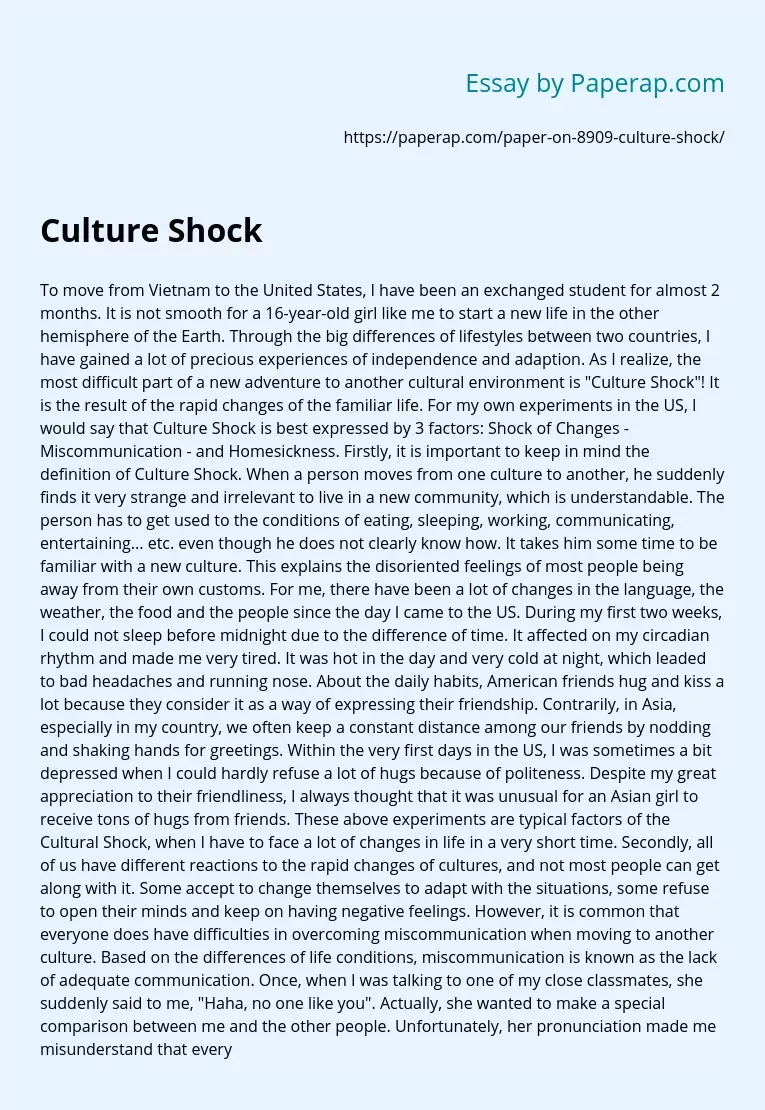Culture Shock Example
To move from Vietnam to the United States, I have been an exchanged student for almost 2 months. It is not smooth for a 16-year-old girl like me to start a new life in the other hemisphere of the Earth. Through the big differences of lifestyles between two countries, I have gained a lot of precious experiences of independence and adaption. As I realize, the most difficult part of a new adventure to another cultural environment is “Culture Shock”! It is the result of the rapid changes of the familiar life.
For my own experiments in the US, I would say that Culture Shock is best expressed by 3 factors: Shock of Changes – Miscommunication – and Homesickness. Firstly, it is important to keep in mind the definition of Culture Shock. When a person moves from one culture to another, he suddenly finds it very strange and irrelevant to live in a new community, which is understandable. The person has to get used to the conditions of eating, sleeping, working, communicating, entertaining… etc.
even though he does not clearly know how.
It takes him some time to be familiar with a new culture. This explains the disoriented feelings of most people being away from their own customs. For me, there have been a lot of changes in the language, the weather, the food and the people since the day I came to the US. During my first two weeks, I could not sleep before midnight due to the difference of time. It affected on my circadian rhythm and made me very tired.
It was hot in the day and very cold at night, which leaded to bad headaches and running nose.
About the daily habits, American friends hug and kiss a lot because they consider it as a way of expressing their friendship. Contrarily, in Asia, especially in my country, we often keep a constant distance among our friends by nodding and shaking hands for greetings. Within the very first days in the US, I was sometimes a bit depressed when I could hardly refuse a lot of hugs because of politeness. Despite my great appreciation to their friendliness, I always thought that it was unusual for an Asian girl to receive tons of hugs from friends.
These above experiments are typical factors of the Cultural Shock, when I have to face a lot of changes in life in a very short time. Secondly, all of us have different reactions to the rapid changes of cultures, and not most people can get along with it. Some accept to change themselves to adapt with the situations, some refuse to open their minds and keep on having negative feelings. However, it is common that everyone does have difficulties in overcoming miscommunication when moving to another culture.
Based on the differences of life conditions, miscommunication is known as the lack of adequate communication. Once, when I was talking to one of my close classmates, she suddenly said to me, “Haha, no one like you”. Actually, she wanted to make a special comparison between me and the other people. Unfortunately, her pronunciation made me misunderstand that everybody hated me. Then I stopped talking with her because I was really upset. Two days later, after I told her the reason, we both laughed at our miscommunication and considered it as one of the most embarrassing experiences in our lives.
For my own experiences, I would say that miscommunication is one of the most typical elements of Culture Shock. Finally, homesickness is the result of these above factors. Shock of Changes and Miscommunication can possibly remind a person of his own culture, and sometimes they make him want to leave the new one for his hometown. Homesickness, for me, is the biggest problem of Culture Shock, because it is caused by emotions and feelings. That’s why we cannot control it all the time as we want.
It can even make people cry and keep on feeling negative. However, it doesn’t mean that overcoming homesickness is impossible. After two weeks in the US, I gradually realize the beauty of American culture and feel more comfortable to accept it. I can sleep well and enjoy the food more, which make me feel much better. Although there is still some confusion, I have gained more energy to start everything. I think I have been through Excitement and Withdrawl, and I am trying to jump from Adjustment to Enthusiasm when I live in the US.
In conclusion, Culture Shock is unavoidable for most people who move from one culture to another. It does have disadvantages, however, it makes us realize how much we love our cultures and how close we are to our hometowns. Therefore, I don’t consider Culture Shock as a bad problem. It teaches me how to join the world and adapt with different life conditions. In my opinion, the best solution for Culture Shock is preparing good spirit for changes of life, keeping healthy and being self-confident in every situation we face to!
Culture Shock Example. (2017, Nov 17). Retrieved from https://paperap.com/paper-on-8909-culture-shock/

